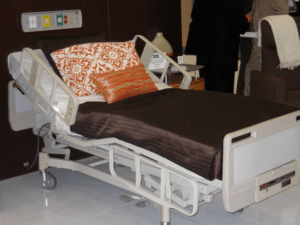Postoperative care checklist for patients | MonitorTech.org
Every day people across the country must undergo some form of operation. These procedures range from minor to major surgeries with varying degrees of risk. Although there are profound differences in the types of operations that people must undergo, there are some commonalities as well, such as basic postoperative care. Although postoperative care is tailored to suit specific surgeries, certain aspects of postoperative careare the same at a fundamentallevel. People who are undergoing a surgical procedure should understand what postoperative care is and why it is important for a safe recovery.

“Surgery” by Army Medicine is licensed under CC BY 2.0
What is post-operative care?
When a person has surgery, whether at a surgical center or a hospital, care is needed to ensure a safe and timely recovery. This type of care is referred to as postoperative care and it begins immediately following a surgical procedure.
Successful postoperative care requires the knowledge and diligence of the attending physician, nurses and other healthcare practitioners, such as staff with monitor tech training, for example. In addition, patient cooperation also plays an important part in their postoperative care. Postoperative care is ongoing, continuing until the patient has recovered.
What postoperative complications might occur?
Following a surgical procedure, there are a number of potential complications that patients and their doctors must be aware of. These complications range from minor to life-threatening.
For people who have undergone surgery with regional or general anesthesia, there are additional complications that may occur. In general, postoperative concerns include pain, infection, and lack of energy. Some patients may experience shortness of breath that occurs as a result of a partially collapsed lung, and atrophy of muscles over time. Swelling or pain in the legs or calf may be signs of a blood clot in the legs. This can become an even greater threat if the blood clot moves into the lungs as it can result in pulmonary embolism, which can be fatal.
Other complications that patients may face include additional breathing and lung complications, bleeding from a surgical site, shock, and urinary retention. Side-effects caused by anesthesia may include, but are not limited to, feelings of confusion or delirium, soreness of the throat, nausea, vomiting, cardiovascular collapse, injury to the nerves, respiratory depression, headache, backache, and even death.
Luckily, postoperative care is designed to decrease the risk of any of these complications. The surgeon and anesthesiologist will typically discuss potential complications with the patient prior to conducting surgery.
- Common surgery complications
- Important complications of anesthesia
- Discomforts and complications following surgery
What to expect in the hospital
One thing to expect is the physician and the nurses routinely monitoring vital signs following a procedure. For example, a person who has successfully completed monitor tech training and has received the appropriate certification may check for cardiac arrhythmias.

“Caronlina Hospital Bed” by BFI Office Furniture is licensed under CC BY-SA 2.0
f required, the doctor will also control pain with the help of some form of pain medication. Initially following the procedure, this will occur in a post-op room or a post-anesthesia care unit or PACU. If a person has been given anesthesia, symptoms such as grogginess, nausea, and confusion are common. Not everyone experiences these things.
Patients who have had an inpatient procedure will be taken to a regular hospital room where they can expect further monitoring of their temperature, heart rate, and other vitals, including oxygen levels. Regardless of whether a person has had an inpatient or outpatient procedure, they will need to demonstrate the ability to breathe normally, urinate, and drink. People who are in the hospital for longer periods may also be expected to walk some to avoid the formation of blood clots.
- What’s it like to have surgery?
- Gynecologic oncology: What to expect in the hospital after your surgery (PDF)
- What to expect with surgery
- What to expect in the recovery room or PACU
Questions to ask the doctor before going home
Before being discharged following a surgical procedure, patients need the information to ensure continued recovery. Often this information concerns what can and cannot be done at home. For example, a patient will need to know how much physical work or activity they can safely do and how long any limitations may last.
The doctor will typically review medications. If not, the patient shouldn’t hesitate to ask what medications they will be taking, why, and when they should be taken. In addition, if there are any questions about medications, they should be asked at this time. Adress questions about follow-up care before departing the hospital or surgery center.
- Who will provide follow-up care after the discharge? Get any pertinent information for follow-up care, such as phone numbers and addresses.
- What do I do if there are changes? Patients should question what potentially harmful symptoms to look out for, and which symptoms or changes are to be expected.
- At what point medical help should be sought if things do begin to change? Clarify whether you should call the doctor or visit an emergency room.
-
Ask anything else that worries you. In general, patients should ask any questions that they may have, and express any concerns.
- Discharge planning
- After surgery
- Reference library — postoperative care
Postoperative recovery at home
Although a patient has returned home following a procedure, their postoperative care must continue. The most important aspects of at-home postoperative care and recovery include keeping all follow-up appointments and following instructions as provided. Medications must be taken as prescribed and not discontinued unless instructed to do so.
Follow dietary instructions as provided, and avoid alcohol while recovering and taking medications. Do not drive a vehicle if taking medications or if they feel dizzy, drowsy, or unwell. Otherwise, driving may resume when the doctor feels that it is safe to do so. Have someone available to help around the house and with care needs determined by the procedure performed. Most importantly, call the doctor or seek emergency care if there is an increase in pain, abnormal bleeding, or a fever has developed.
- General post-operative instructions
- Post-operative and post-anesthetic care: Caring for your child at home
Written by Judith Haluka on Mar 30, 2017
Last reviewed and updated by Caitlin Goodwin on Aug 23, 2021

